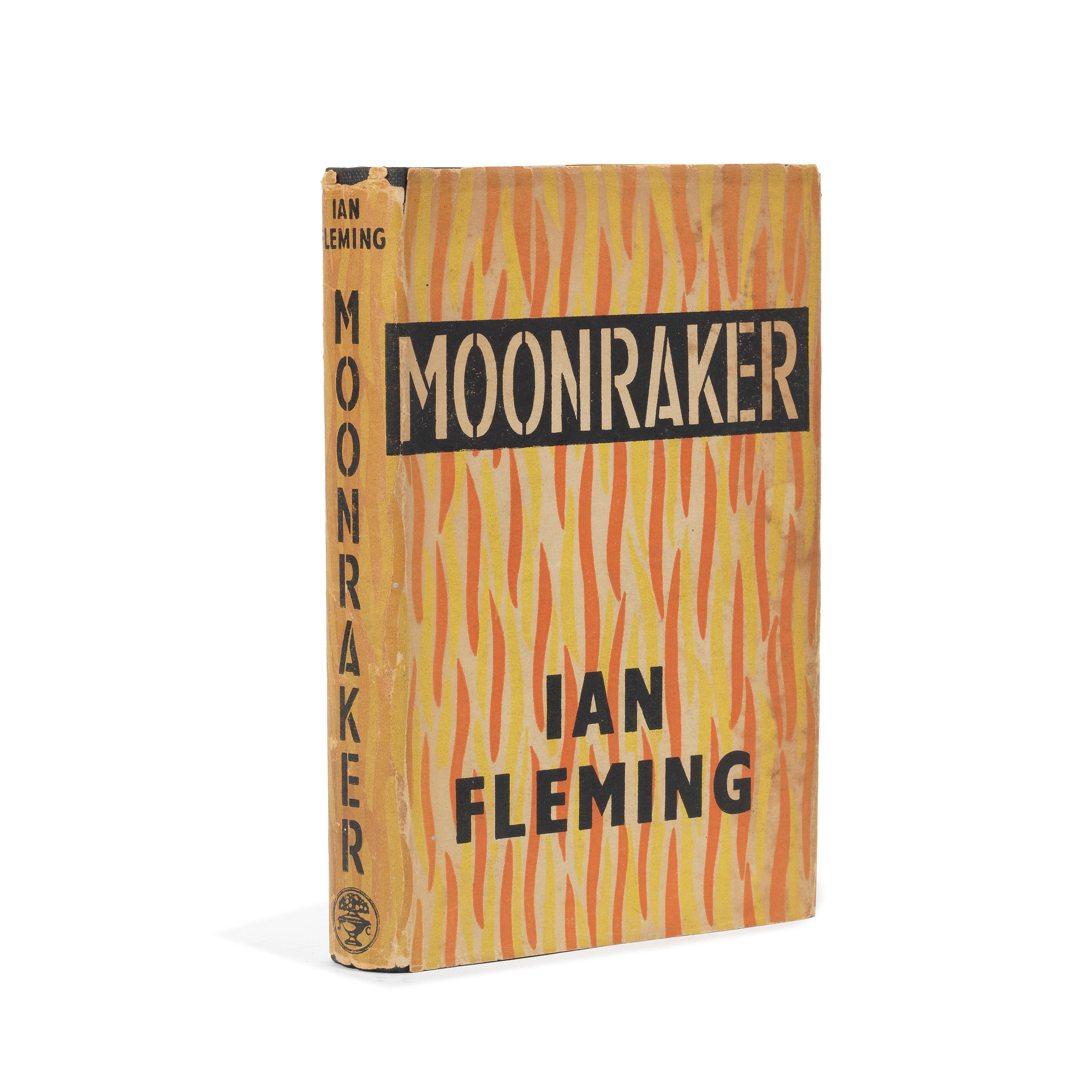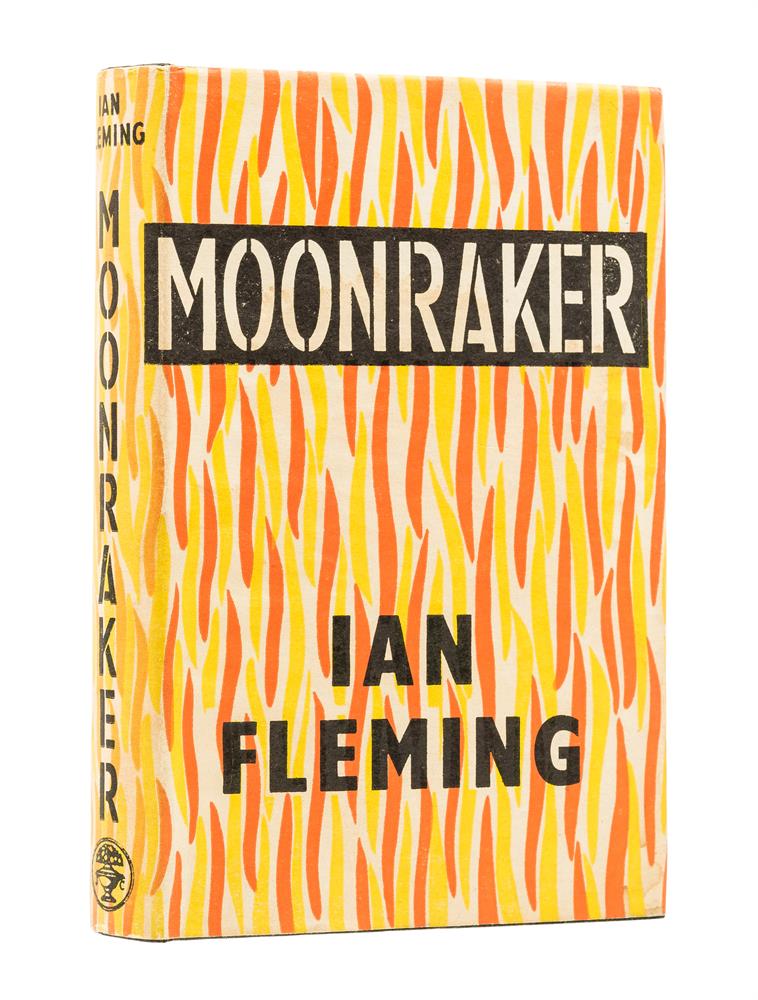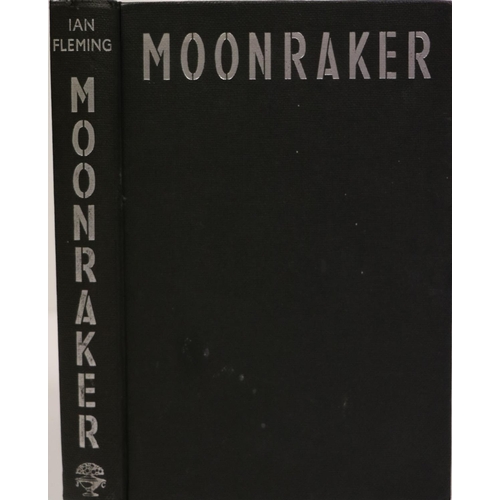Fleming, IanMoonraker. New York: Macmillian, 1955
8vo. Publisher's green cloth, lettered in black: spine somewhat toned, edges lightly grazed. Pictorial dust-jacket; three patches of loss to upper cove, very small chips to head and foot of spine, rear cover a little spotted and toned, spine slightly sunned.
First American edition, inscribed to his American Publisher Al Hart: "To Al | my American | publisher & conspirator.| Ian-1955."
Ian Fleming first met Al Hart in 1953, the year that he published Casino Royale. Al worked for Macmillan, the American publishing house that took the James Bond series on. He was appointed Ian’s editor for his first seven books in the US and would “become his crony, confidant, and drinking companion on all his subsequent visits to New York”.
A number of changes were made to the series when it was published in the States in order to make the quintessentially British fiction palatable to the American market. When the American Popular Library published Casino Royale, they changed the title to You Asked For It, a catchy name imitative of popular pulp detective books. Al wrote to Fleming, “the Great Unwashed won’t know how to pronounce “Royale”... If “You Asked For It” turns your stomach bright green, it might be a good idea to suggest an alternative title or titles.”
Al was a passionate admirer of Fleming and his faithful champion in America, despite the slow start the series had there. Bond took some time to enter the American consciousness and by the time Casino Royale had reprinted twice and sold over 8,000 copies in the UK (see lot 1120), it had sold barely 4,000 copies in the US with Macmillan. However, this was still a strong start for an unknown British author and Hart’s letters to Fleming at this time were filled with hope and admiration.
Al had an excellent eye for marketing, and when it came to jacket design he often took it upon himself to create eye-catching covers that were to Fleming’s liking. Aware of Fleming’s penchant for Richard Chopping’s jacket designs, Al organized the illustration for Thunderball (see lot 1128) to be sent to the US and used for the jacket of the Bond omnibus, Gilt Edged Bonds (see lot 1130). Macmillan therefore incorporated Chopping's design into a composition arranged by Leo Manso who was responsible for a number of the American first edition jackets, including Moonraker (lot 1123). Unfortunately, Chopping's artwork was damaged in the process. Although the dedicated Al Hart had it restored and returned to Fleming in "its pristine glory" (letter from Hart to Fleming, July 1961), Chopping's designs were never sent over to the US again and Macmillan had to resort to other artists for later American editions of the Bond series.
Al Hart was instrumental in the historic edits made to the American edition of Live and Let Die (see lot 1122) where he deleted or changed passages that he felt were racially troubling. Fleming approved the changes and, according to letters, seems to have preferred the amended American version. The Fleming family, when publishing the 70th anniversary editions of the Bond series, used Al’s thoughtful edits as the basis for their alteration of the texts for modern readership, applying “the sensibilities of the original US edition of Live and Let Die consistently.” Al Hart’s enormous positive influence on the legacy of Fleming, therefore, cannot be overstated.
Even when Fleming moved to Viking when it came to publishing For Your Eyes Only, he remained on close terms with Hart, sending him presentation copies for For Your Eyes Only (see lot 1127), Thunderball (see lot 1128) and The Spy Who Loved Me (see lot 1129), showing the genuine friendship between the two men that emerged from their professional affiliation.
Moonraker was published in the US in the fall of 1955, delayed in order not to compromise sales of Live and Let Die, which underwent its first American printing earlier in the year. The dust jacket was designed by Leo Manso the last he would produce for the Bond series (though he was also commissioned to design the jacket of Gilt Edged Bonds, see lot 1130), and features the skeletal hand now synonymous with Bond jacket designs thanks to the later adoption of the motif by Richard Chopping.
REFERENCE:Gilbert A3b (1)
PROVENANCE:Al Hart (presentation inscription)
Fleming, IanMoonraker. New York: Macmillian, 1955
8vo. Publisher's green cloth, lettered in black: spine somewhat toned, edges lightly grazed. Pictorial dust-jacket; three patches of loss to upper cove, very small chips to head and foot of spine, rear cover a little spotted and toned, spine slightly sunned.
First American edition, inscribed to his American Publisher Al Hart: "To Al | my American | publisher & conspirator.| Ian-1955."
Ian Fleming first met Al Hart in 1953, the year that he published Casino Royale. Al worked for Macmillan, the American publishing house that took the James Bond series on. He was appointed Ian’s editor for his first seven books in the US and would “become his crony, confidant, and drinking companion on all his subsequent visits to New York”.
A number of changes were made to the series when it was published in the States in order to make the quintessentially British fiction palatable to the American market. When the American Popular Library published Casino Royale, they changed the title to You Asked For It, a catchy name imitative of popular pulp detective books. Al wrote to Fleming, “the Great Unwashed won’t know how to pronounce “Royale”... If “You Asked For It” turns your stomach bright green, it might be a good idea to suggest an alternative title or titles.”
Al was a passionate admirer of Fleming and his faithful champion in America, despite the slow start the series had there. Bond took some time to enter the American consciousness and by the time Casino Royale had reprinted twice and sold over 8,000 copies in the UK (see lot 1120), it had sold barely 4,000 copies in the US with Macmillan. However, this was still a strong start for an unknown British author and Hart’s letters to Fleming at this time were filled with hope and admiration.
Al had an excellent eye for marketing, and when it came to jacket design he often took it upon himself to create eye-catching covers that were to Fleming’s liking. Aware of Fleming’s penchant for Richard Chopping’s jacket designs, Al organized the illustration for Thunderball (see lot 1128) to be sent to the US and used for the jacket of the Bond omnibus, Gilt Edged Bonds (see lot 1130). Macmillan therefore incorporated Chopping's design into a composition arranged by Leo Manso who was responsible for a number of the American first edition jackets, including Moonraker (lot 1123). Unfortunately, Chopping's artwork was damaged in the process. Although the dedicated Al Hart had it restored and returned to Fleming in "its pristine glory" (letter from Hart to Fleming, July 1961), Chopping's designs were never sent over to the US again and Macmillan had to resort to other artists for later American editions of the Bond series.
Al Hart was instrumental in the historic edits made to the American edition of Live and Let Die (see lot 1122) where he deleted or changed passages that he felt were racially troubling. Fleming approved the changes and, according to letters, seems to have preferred the amended American version. The Fleming family, when publishing the 70th anniversary editions of the Bond series, used Al’s thoughtful edits as the basis for their alteration of the texts for modern readership, applying “the sensibilities of the original US edition of Live and Let Die consistently.” Al Hart’s enormous positive influence on the legacy of Fleming, therefore, cannot be overstated.
Even when Fleming moved to Viking when it came to publishing For Your Eyes Only, he remained on close terms with Hart, sending him presentation copies for For Your Eyes Only (see lot 1127), Thunderball (see lot 1128) and The Spy Who Loved Me (see lot 1129), showing the genuine friendship between the two men that emerged from their professional affiliation.
Moonraker was published in the US in the fall of 1955, delayed in order not to compromise sales of Live and Let Die, which underwent its first American printing earlier in the year. The dust jacket was designed by Leo Manso the last he would produce for the Bond series (though he was also commissioned to design the jacket of Gilt Edged Bonds, see lot 1130), and features the skeletal hand now synonymous with Bond jacket designs thanks to the later adoption of the motif by Richard Chopping.
REFERENCE:Gilbert A3b (1)
PROVENANCE:Al Hart (presentation inscription)















Testen Sie LotSearch und seine Premium-Features 7 Tage - ohne Kosten!
Lassen Sie sich automatisch über neue Objekte in kommenden Auktionen benachrichtigen.
Suchauftrag anlegen